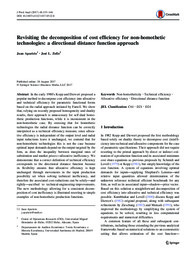Please use this identifier to cite or link to this item:
https://hdl.handle.net/11000/4940Full metadata record
| DC Field | Value | Language |
|---|---|---|
| dc.contributor.author | Aparicio Baeza, Juan | - |
| dc.contributor.author | Zofío, José L. | - |
| dc.contributor.other | Departamentos de la UMH::Estadística, Matemáticas e Informática | es |
| dc.date.accessioned | 2018-12-18T12:05:09Z | - |
| dc.date.available | 2018-12-18T12:05:09Z | - |
| dc.date.created | 2018-08-18 | - |
| dc.date.issued | 2018-12-18 | - |
| dc.identifier.issn | 0895-562X | - |
| dc.identifier.issn | 153-0441 | - |
| dc.identifier.uri | http://hdl.handle.net/11000/4940 | - |
| dc.description.abstract | In the early 1980’s Koop and Diewert proposed the decomposition of cost efficiency into allocative and technical efficiency for parametric functional forms based on the radial approach initiated by Farrell. We show that such approach is only valid for homothetic technologies where the radial distance function can be correctly interpreted as a technical efficiency measure since allocative efficiency is independent of the output level and radial input reductions leave it unchanged. For the general case of non-homothetic technologies where optimal input demands depend on the output targeted by the firm, as does the inequality between marginal rates of substitution and market pricesallocative inefficiency, we show that the correct definition of technical efficiency corresponds to the directional distance function. Indeed, its flexibility ensures that allocative efficiency is kept unchanged through movements in the input production possibility set when solving technical inefficiency, and therefore the associated cost reductions can be solelyand rightlyascribed to technicalengineeringimprovements. The new methodology to consistently decompose cost inefficiency, which generalizes the approach introduced by Koop and Diewert as well as subsequent refinements, is illustrated resorting to familiar examples of both homothetic and non-homothetic production functions | es |
| dc.description.sponsorship | We would like to express our gratitude to the Spanish Ministry for Economy and Competitiveness for supporting us through grant MTM2013-43903-P. | - |
| dc.format | application/msword | es |
| dc.format.extent | 38 | es |
| dc.language.iso | eng | es |
| dc.rights | info:eu-repo/semantics/openAccess | es |
| dc.subject | Technical efficiency | es |
| dc.subject | Allocative efficiency | es |
| dc.subject | Directional Distance Function | es |
| dc.subject.other | 517 - Análisis | es |
| dc.title | Revisiting the decomposition of cost efficiency for non-homothetic technologies: A directional distance function approach | es |
| dc.type | info:eu-repo/semantics/article | es |

View/Open:
Aparicio_Zofio_2017.pdf
1,52 MB
Adobe PDF
Share:
.png)
